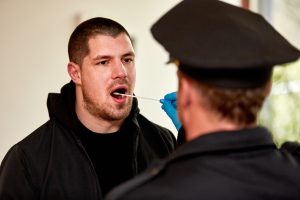 In an Ohio appellate case decided this month, the prosecutor assumed defense counsel’s motion was insufficient, and it did not end well for the prosecutor. Defense lawyers often file motions to suppress evidence in Ohio OVI cases. Occasionally, a prosecutor will claim the motion is not particular enough: it’s a ‘shotgun’ motion attacking all the evidence, or it’s a ‘boilerplate’ motion not sufficiently tailored to the defendant’s specific case. The recent case illustrates a prosecutor making that claim should still be prepared to meet their burden of proof.
In an Ohio appellate case decided this month, the prosecutor assumed defense counsel’s motion was insufficient, and it did not end well for the prosecutor. Defense lawyers often file motions to suppress evidence in Ohio OVI cases. Occasionally, a prosecutor will claim the motion is not particular enough: it’s a ‘shotgun’ motion attacking all the evidence, or it’s a ‘boilerplate’ motion not sufficiently tailored to the defendant’s specific case. The recent case illustrates a prosecutor making that claim should still be prepared to meet their burden of proof.
Appeals Court Examines DUI / OVI Sentence Changed After Hearing

Raymond Wells walked out of court thinking he knew his sentence and was probably surprised when he later learned it included more than what the judge told him in the courtroom. There is a common saying in the law that “the court speaks through its entries”. What happens if the judge says one thing in open court but another in the sentence entry? A recent case from the Sixth District Court of Appeals gives us an answer.
Podcast Interview: “Key Facts About DUI Revealed In Columbus, OH”
 I recently had the pleasure of being interviewed by Grant Eagle on his podcast “5 Minute Legal Insights”. It actually lasted for ten minutes, and I was just getting warmed up! We discussed common misconceptions about DUI/OVI stops, arrests, and court cases. You can listen to the podcast here, and you can also find it on Apple Podcasts, Google Podcasts, Spotify and Stitcher.
I recently had the pleasure of being interviewed by Grant Eagle on his podcast “5 Minute Legal Insights”. It actually lasted for ten minutes, and I was just getting warmed up! We discussed common misconceptions about DUI/OVI stops, arrests, and court cases. You can listen to the podcast here, and you can also find it on Apple Podcasts, Google Podcasts, Spotify and Stitcher.
Investigative Report Conclusion: Don’t Trust Breath Testing Machines
Defen se attorneys and forensic experts have claimed for years breath-testing machines are unreliable. Those claims tend to fall on deaf ears due to the inherent bias of the source: defense attorneys are advocates for clients accused of crimes based on the results of the machines. Recently, however, more objective sources investigated the reliability of alcohol breath testers and concluded they are often unreliable.
se attorneys and forensic experts have claimed for years breath-testing machines are unreliable. Those claims tend to fall on deaf ears due to the inherent bias of the source: defense attorneys are advocates for clients accused of crimes based on the results of the machines. Recently, however, more objective sources investigated the reliability of alcohol breath testers and concluded they are often unreliable.
DORA & DUI In Ohio
 DORA may be coming to a city near you. Not Dora the Explorer with her singing map and backpack. DORA the law which allows cities to have Designated Outdoor Refreshment Areas. In a DORA, people can walk around with open containers of alcohol purchased from local establishments. The idea behind DORAs is to spur economic development, and cities across Ohio are now implementing DORAs. Here are some facts about DORAs you may be interested to know before visiting one.
DORA may be coming to a city near you. Not Dora the Explorer with her singing map and backpack. DORA the law which allows cities to have Designated Outdoor Refreshment Areas. In a DORA, people can walk around with open containers of alcohol purchased from local establishments. The idea behind DORAs is to spur economic development, and cities across Ohio are now implementing DORAs. Here are some facts about DORAs you may be interested to know before visiting one.
Don’t Be A Target Of DUI / OVI Investigations

You may be more of a target than you think. When you think about people arrested for drunk driving, do you picture a car driving erratically all over the road? That’s a common misconception. Most stops resulting in DUI/OVI charges are for minor offenses: failing to signal, driving a little over the speed limit, crossing a lane line one time. Some are even for non-moving violations: burned-out headlight, no license plate light, expired registration. A case decided last week by the Ohio Supreme Court illustrates how a minor violation can lead to more serious charges.
Solving DUI Mysteries In Las Vegas
 How to improve litigation skills which lead to more acquittals (not guilty verdicts) in DUI/OVI cases can be a mystery. That’s why there are organizations like the National College for DUI Defense (NCDD) and the National Association of Criminal Defense Lawyers (NACDL). Those organizations co-host an annual DUI defense seminar in Las Vegas, and the theme of this year’s seminar was “Solving The Mystery of DUI Acquittals”. I attended the seminar, as I have for over 15 years, and took away valuable insights.
How to improve litigation skills which lead to more acquittals (not guilty verdicts) in DUI/OVI cases can be a mystery. That’s why there are organizations like the National College for DUI Defense (NCDD) and the National Association of Criminal Defense Lawyers (NACDL). Those organizations co-host an annual DUI defense seminar in Las Vegas, and the theme of this year’s seminar was “Solving The Mystery of DUI Acquittals”. I attended the seminar, as I have for over 15 years, and took away valuable insights.
Ohio DUI / OVI And Diversion Programs
The conse quences of an OVI/DUI conviction can go well beyond the fines, jail time, and license suspensions imposed by a Judge. Collateral effects like higher insurance premiums and lost employment opportunities can follow someone well after their case has been resolved in court. Some states, even notoriously tough-on-crime states like Texas, allow first-time OVI/DUI offenders to avoid the long term consequences of a conviction by completing a pretrial diversion program.
quences of an OVI/DUI conviction can go well beyond the fines, jail time, and license suspensions imposed by a Judge. Collateral effects like higher insurance premiums and lost employment opportunities can follow someone well after their case has been resolved in court. Some states, even notoriously tough-on-crime states like Texas, allow first-time OVI/DUI offenders to avoid the long term consequences of a conviction by completing a pretrial diversion program.
Should Ohio Use Roadside Drug Test For Marijuana DUI / OVI?
 The ever-growing number of states which have legalized either medical marijuana or recreational marijuana has created a number of issues for law enforcement and the justice system. Chief among those issues is the challenge of enforcing laws against operating a vehicle under the influence of marijuana. In an effort to overcome this challenge, the Norwegian company Drauger developed the DrugTest 5000. This system uses a mouth swab, taken roadside, to help determine if a driver is under the influence of marijuana or other drugs. The DrugTest 5000 has been in use in Norway since 2015 and has seen growing use in the United States. This test, however, is probably not the solution for law enforcement’s problems.
The ever-growing number of states which have legalized either medical marijuana or recreational marijuana has created a number of issues for law enforcement and the justice system. Chief among those issues is the challenge of enforcing laws against operating a vehicle under the influence of marijuana. In an effort to overcome this challenge, the Norwegian company Drauger developed the DrugTest 5000. This system uses a mouth swab, taken roadside, to help determine if a driver is under the influence of marijuana or other drugs. The DrugTest 5000 has been in use in Norway since 2015 and has seen growing use in the United States. This test, however, is probably not the solution for law enforcement’s problems.
Auto Insurance And DUI / OVI In Ohio

If you think about the consequences of getting a DUI (called OVI in Ohio), the first thing which comes to mind is probably the sentence from the court. There is good reason for that: the sentence includes a mandatory jail term, license suspension, and fine as well as possible yellow plates, ignition interlock, and probation. In addition to the sentence imposed by the judge, however, there are collateral consequences for DUI/OVI convictions. One of those consequences is skyrocketing auto insurance premiums.
 Columbus OVI/DUI Attorney Blog
Columbus OVI/DUI Attorney Blog

